- 1 Introduction
- 2 Understanding Newborn Baby Cold Symptoms
- 3 Common Causes of Newborn Baby Colds
- 4 Home Remedies to Alleviate a Newborn’s Cold
- 4.1 1. Ensure Proper Hydration
- 4.2 2. Steam Therapy
- 4.3 3. Use a Humidifier
- 4.4 4. Elevate the Baby’s Head
- 4.5 5. Saline Nasal Drops
- 4.6 6. Breastfeeding
- 4.7 7. Warm Bath
- 4.8 8. Garlic and Honey Remedy
- 4.9 9. Mustard Oil Massage
- 4.10 10. Turmeric Milk
- 4.11 11. Eucalyptus Oil
- 4.12 12. Maintain a Clean Environment
- 5 When to Consult a Doctor
- 6 Conclusion
- 7 FAQs About Newborn Baby Cold Home Remedies
- 7.1 Can I use over-the-counter cold medicines for my newborn?
- 7.2 How can I prevent my baby from catching a cold?
- 7.3 What’s the ideal room temperature for a sick newborn?
- 7.4 Can I use essential oils to alleviate my baby’s cold symptoms?
- 7.5 Is it safe to give my baby herbal teas for cold relief?
- 7.6 How do you treat a cold in a newborn?
- 7.7 What to do if a newborn is cold?
- 7.8 How can I reduce my newborn’s cold?
- 7.9 What medicine can you give a newborn for a cold?
- 7.10 How can I clear my baby’s nose?
Introduction
Newborn baby cold home remedies, welcoming a newborn into your family is a joyous occasion, but it also comes with responsibilities, especially when your baby falls ill. Newborns are susceptible to various health issues, including the common cold. In this article, we’ll discuss effective home remedies to provide relief for your little one’s cold symptoms.
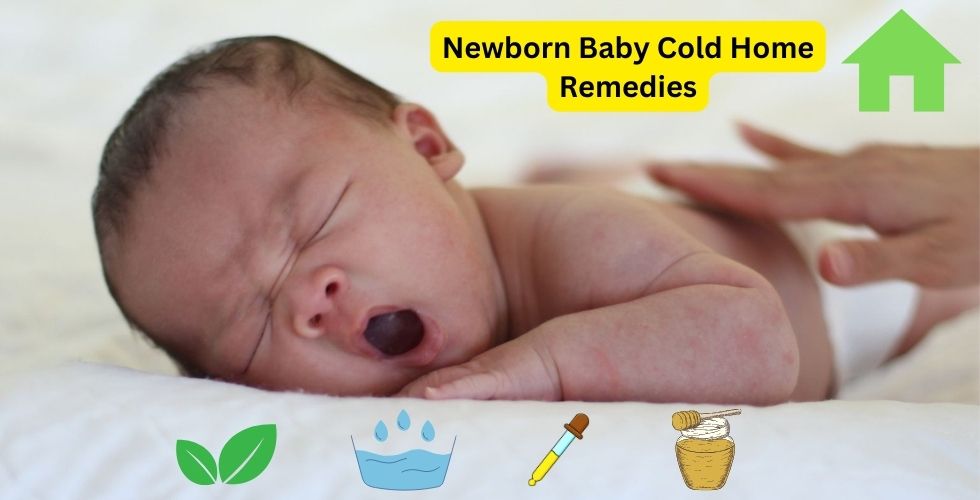
Understanding Newborn Baby Cold Symptoms
Before we delve into newborn baby cold home remedies, it’s essential to understand the signs of a newborn’s cold. Common symptoms include a runny or stuffy nose, sneezing, coughing, a mild fever, and fussiness. Although a cold in a newborn can be distressing, there are ways to alleviate their discomfort.
Common Causes of Newborn Baby Colds
Newborns primarily catch colds due to exposure to viruses, and their immune systems are still developing. They can contract cold viruses from caregivers, family members, or environmental factors. Now, let’s explore some effective home remedies to help your baby recover from a cold.
Also Read : Stretches to Get Taller
Home Remedies to Alleviate a Newborn’s Cold
1. Ensure Proper Hydration
Maintaining adequate hydration is crucial. Ensure your baby drinks sufficient breast milk or formula. Hydration helps thin mucus, making it easier for your baby to breathe.
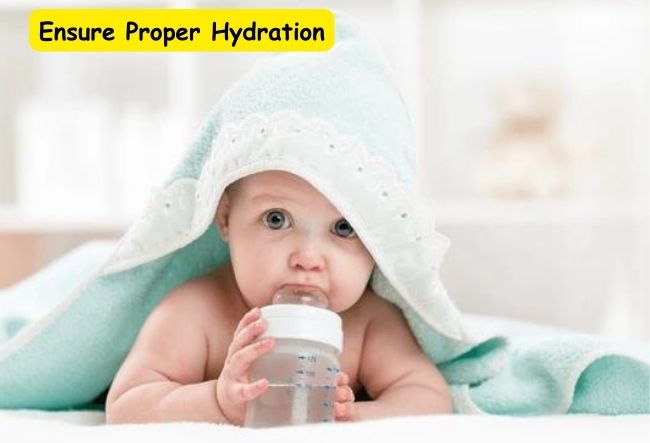
2. Steam Therapy
Steam therapy is a great way to relieve congestion. Take your baby into a steamy bathroom for a while, or use a humidifier in the nursery to add moisture to the air.
3. Use a Humidifier
A humidifier in your baby’s room can make a significant difference. It helps keep the air moist, which can soothe a congested nose and throat.
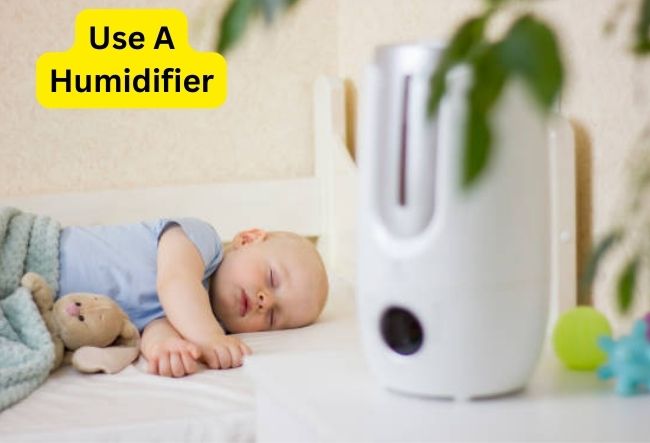
4. Elevate the Baby’s Head
Elevating your baby’s head slightly during sleep can promote better breathing. You can use a folded towel under the mattress to achieve this.
5. Saline Nasal Drops
Saline nasal drops are safe for newborns and can help clear nasal congestion. A couple of drops in each nostril followed by gentle suction using a nasal aspirator can provide relief.
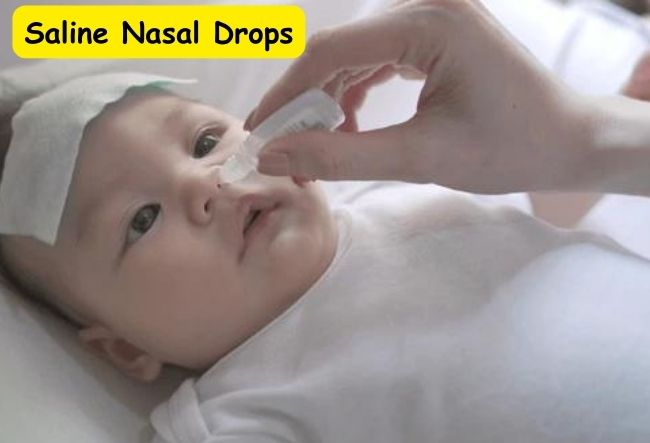
6. Breastfeeding
Breast milk contains antibodies that can help improve your baby’s immune system. It’s essential to continue breastfeeding even when your baby has a cold.
7. Warm Bath
A warm bath can be soothing for your baby and help lower their fever. Ensure the water is comfortably warm, and never leave your baby unattended.
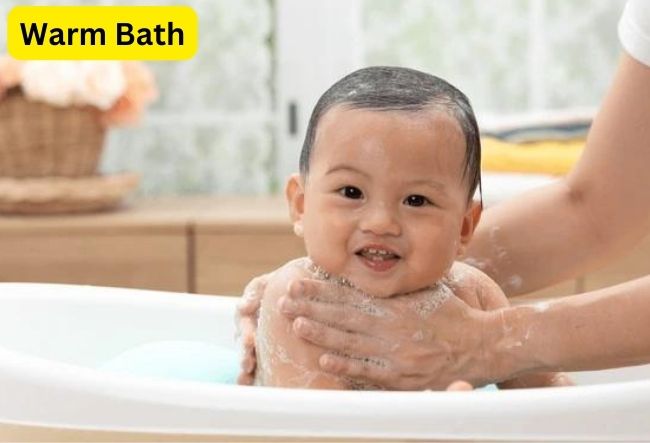
8. Garlic and Honey Remedy
A mixture of crushed garlic and a small amount of honey (for babies older than one year) can be beneficial. Consult your pediatrician before using this remedy.
9. Mustard Oil Massage
Gently massaging your baby’s chest and back with warm mustard oil can provide comfort and relieve congestion.
10. Turmeric Milk
Turmeric milk has anti-inflammatory properties. Adding a pinch of turmeric to your baby’s warm milk can help alleviate cold symptoms.
11. Eucalyptus Oil
Use eucalyptus oil in a diffuser or vaporizer (out of your baby’s reach) to help clear nasal passages. Ensure the room is well-ventilated.
12. Maintain a Clean Environment
Regularly clean and disinfect your baby’s room and toys to prevent the spread of germs.
Here Is Detailed Video Guide About Newborn Baby Cold Home Remedies
When to Consult a Doctor
While these home remedies are effective in most cases, it’s crucial to consult a pediatrician if your baby’s condition worsens, they have difficulty breathing, or their fever persists. Newborns require special care, and a doctor’s advice is invaluable.
Conclusion
Caring for a newborn with a cold can be a challenging experience for parents. However, with the right knowledge and home remedies, you can help alleviate your baby’s discomfort. Remember to consult a healthcare professional if needed, as your baby’s well-being is a top priority.
Also Read : Average Weight of Newborn Baby
FAQs About Newborn Baby Cold Home Remedies
Can I use over-the-counter cold medicines for my newborn?
It’s best to avoid over-the-counter cold medicines for newborns. Consult your pediatrician for appropriate remedies.
How can I prevent my baby from catching a cold?
Practicing good hand hygiene and limiting contact with sick individuals can help prevent your baby from catching a cold.
What’s the ideal room temperature for a sick newborn?
Maintain a comfortable room temperature of around 68-72°F (20-22°C) for your baby.
Can I use essential oils to alleviate my baby’s cold symptoms?
Some essential oils can help, but always consult with your pediatrician before using them on or around your baby.
Is it safe to give my baby herbal teas for cold relief?
Herbal teas may not be suitable for newborns. Consult your doctor for safe options.
How do you treat a cold in a newborn?
Here are some tips for treating a cold in a newborn:
1. Elevate your baby’s head by placing a rolled-up towel or blanket under their mattress. This can help to loosen mucus and make it easier for them to breathe.
2. Use a nasal aspirator if you are unable to suction out mucus with a bulb syringe. Nasal aspirators are electric devices that are designed to suction out mucus from the nose.
3. Give your baby a lukewarm bath to help loosen mucus and make them feel more comfortable.
4. Use a humidifier at night to help your baby breathe easier while they are sleeping.
What to do if a newborn is cold?
Newborns are particularly sensitive to temperature changes, and it’s important to keep them warm to prevent hypothermia. Here are some things you can do to warm up a cold newborn:
1. Dress your baby in warm layers. This includes a hat, socks, and mittens, as well as a warm bodysuit or pajamas.
2. Swaddle your baby. Swaddling helps to keep babies warm and secure, and it can also help them to calm down.
3. Hold your baby close to your skin. Your body heat can help to warm your baby.
4. Use a warm blanket. Place a warm blanket over your baby, but make sure they are not overheating.
5. Give your baby a warm bath. A lukewarm bath can help to warm your baby from the inside out.
6. Use a heating pad. A heating pad can be placed on your baby’s back or chest for a few minutes at a time.
7. Feed your baby. Breast milk or formula can help to warm your baby from the inside out.
8. Monitor your baby’s temperature. A normal body temperature for a newborn is between 97 and 100 degrees Fahrenheit (36 and 38 degrees Celsius). If your baby’s temperature is below 95 degrees Fahrenheit (35 degrees Celsius), seek medical attention immediately.
How can I reduce my newborn’s cold?
1. Hydration: Maintaining hydration is crucial to prevent dehydration, which can worsen cold symptoms. Continue breastfeeding or formula-feeding as usual. For babies over six months old, you can offer small amounts of water.
2. Clear Nasal Passages: A stuffy nose can make breathing and feeding difficult. Use a bulb syringe to gently suction out mucus from your baby’s nostrils. You can first soften the mucus by applying saline nasal drops or spray.
3. Humidify the Air: Dry air can exacerbate nasal congestion. A cool-mist humidifier can add moisture to the air, making it easier for your baby to breathe. Avoid hot-water humidifiers due to the burn risk.
4. Encourage Rest: Sleep is essential for the body to heal from illness. Create a calm and comfortable sleep environment for your baby.
5. Monitor for Worsening Symptoms: While most colds resolve on their own, be aware of signs that may indicate a more serious condition, such as a high fever, difficulty breathing, or decreased appetite. Consult your baby’s pediatrician if you have concerns.
6. Avoid Over-the-Counter Medications: Over-the-counter cold medications are not recommended for newborns or infants under six months old. These medications can have serious side effects and are not effective against viruses.
7. Practice Good Hygiene: Wash your hands frequently to prevent the spread of germs. Avoid kissing or touching your baby’s face and encourage others to do the same.
8. Monitor Temperature: A low-grade fever is common with colds. If your baby’s temperature exceeds 100.4°F (38°C), consult your pediatrician.
What medicine can you give a newborn for a cold?
It is not recommended to give any over-the-counter (OTC) cold medications to newborns or infants under six months old. These medications can have serious side effects and are not effective against viruses, the cause of most common colds.
If your newborn has a cold, the best thing you can do is to provide supportive care at home, such as:
1. Hydration: Continue to breastfeed or formula-feed your baby as usual. For babies over six months old, you can offer small amounts of water.
2. Clear nasal passages: Use a bulb syringe to gently suction out mucus from your baby’s nostrils. You can first soften the mucus by applying saline nasal drops or spray.
3. Humidify the air: A cool-mist humidifier can add moisture to the air, making it easier for your baby to breathe. Avoid hot-water humidifiers due to the burn risk.
4. Encourage rest: Sleep is essential for the body to heal from illness. Create a calm and comfortable sleep environment for your baby.
How can I clear my baby’s nose?
A stuffy nose can be uncomfortable for babies, making it difficult for them to breathe and feed. Here are some safe and effective methods to clear your baby’s nose:
1. Saline drops or spray: Saline solution, available over-the-counter, helps loosen mucus and congestion. Gently tilt your baby’s head back and administer 1-2 drops of saline into each nostril. Wait a few minutes to allow the saline to work, then suction out the loosened mucus.
2. Bulb syringe: A bulb syringe is a gentle and effective way to suction out mucus. Squeeze the bulb to expel air, then gently insert the tip into your baby’s nostril. Release the bulb to draw mucus into the syringe. Repeat for the other nostril.
3. Nasal aspirator: A nasal aspirator is another suction device that may be more effective for removing thicker mucus. Follow the manufacturer’s instructions for proper use.
4. Steam session: Steam can help loosen mucus and make it easier to clear. Run a hot shower or fill a sink with hot water and add a few drops of essential oil like eucalyptus or peppermint (avoid using essential oils directly on your baby’s skin). Sit in the steamy bathroom with your baby for 10-15 minutes.
5. Elevated sleeping position: Elevating your baby’s head while sleeping can help prevent mucus from pooling in the nasal passages and making congestion worse. You can use a rolled-up towel or a specially designed crib wedge under the crib mattress, ensuring your baby’s head is slightly elevated.
6. Humidify the air: Dry air can worsen congestion. A cool-mist humidifier can add moisture to the air, making it easier for your baby to breathe. Avoid hot-water humidifiers due to the burn risk.